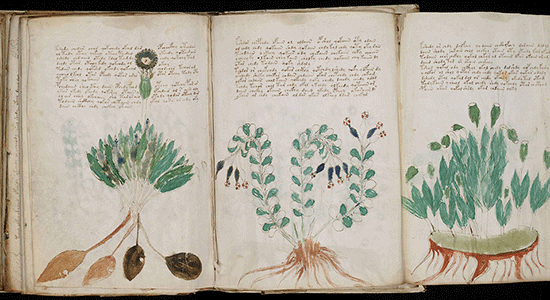It’s no longer an aberration for artists to collaborate in the cloud, given the ease with which most of the world accesses high-speed internet. And A Sunny Day In Glasgow—collectively based in Philadelphia, Brooklyn and Sydney, Australia—creates the sort of impressionistic guitar pop that feels ripe for working in the ether. But that doesn’t mean the process of writing fine new album Sea When Absent (Lefse) across three cities and two hemispheres was ideal. In fact, the method was so present that it became a centerpiece of its narrative. The band will be guest editing magnetmagazine.com all week. Read our new feature on the band.

Jen Goma: The Voynich Manuscript has long been a source of fascination to me. An illustrated codex handwritten in an unknown writing system, the book has been carbon dated back to the early 15th century, but that’s about all anyone knows about its origins for sure. It has been the subject of immense speculation throughout the ages, with professional and amateur code breakers and cryptographers attempting to uncover its secrets (if, indeed, it has any secrets) since the WWI.
Rare book dealer William Voynich purchased the manuscript in Italy during a book sale at a Jesuit college. It was Voynich who first brought it to public attention in 1912. Research soon revealed that a book matching its description had been mentioned in a letter in 1666, as a notable and mysterious book in the collection of Emperor Rudolf II. The author of the letter theorized that the author of it was polymath Francis Bacon.
Here’s what people know for sure:
1) It appears that at one point it was 272 pages, though some have been removed, and we have only 240.
2) These pages contains about 170,000 glyphs, which can be ordered into an alphabet of about 30 recurring combinations. Statistical analysis has revealed that the order follows almost all patterns of “natural language,” which means that to most linguistic experts, this very well could be a coded language, or perhaps even a lost language.
3) In addition to the script, there are illustrations on every page. These illustrations depict plants that don’t exist, astrological or astronomical charts that appear to be impossible, and nude women bathing in tubs connected by pipes that closely resemble human anatomy. They are beautiful illustrations, and they never fail to unnerve me.
4) There is also a section that appears to be an ingredient list, complete with instructions for brewing, which led some medieval thinkers to hypothesize that perhaps the book held the secret to eternal life.
Its totally impenetrable nature have led some to hypothesize that it might be some kind of epic medieval prank, perpetuated for money or perhaps just medieval lolz. But that hasn’t stopped people from falling into its abyss. Many academics have staked their reputations and careers on deciphering the Voynich Manuscript, and most have come out the other end empty handed and ridiculed. Some experts have even described the study of these indecipherable manuscripts as “academic suicide.” Perhaps the stigma surrounding it explains why before 2004, the manuscript hadn’t appeared as subject in a single peer-reviewed journal in 50 years.
As for me, I discovered this wonderful, enduring mystery when reading about how Glossolalia, a term for the fluid vocalizing of speech-like syllables that lack any comprehended meaning (often for religious purposes, like speaking in tongues), informed the glorious singing style of the Cocteau Twins’ Liz Fraser. Some linguists believe that the Voynich Manuscript is neither hoax nor codex, but rather a written expression of the inexpressible.
To be honest, the total mutability of the manuscript’s meaning is my favorite thing about it. It has endured for hundreds of years, a piece of blank canvas onto which people can project their desires. Lost natural language, uncrackable code, secret to eternal life or what ever else you wish to believe about it, the book will not disappoint you.





